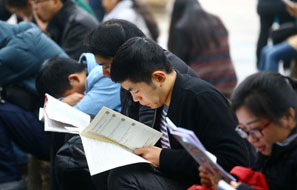Number of beds, midwives must meet new demand
 |
|
A newborn baby is taken care of at Gansu Provincial Maternity and Childcare Hospital in Lanzhou in February. [Photo/Xinhua] |
The universal second-child policy has seen China's birth rate increase rapidly
China will increase the number of beds in obstetrics units and train more midwives to meet the rapidly growing demand for maternal services resulting from the universal second-child policy.
China's top health authority said in a guideline it released on Tuesday that it will speed up training of obstetricians and midwives to produce 140,000 such professionals before 2020.
The National Health and Family Planning Commission also urged local health authorities nationwide to add a total of 89,000 beds in obstetrics units in the next few years to help close the gap between supply and demand of maternal services.
The guideline is intended to improve basic maternal healthcare services to ensure the universal second-child policy, implemented at the beginning of the year, is smoothly executed, the commission said.
There is a severe shortage of obstetricians and midwives in China, with just 30 midwives for every 1 million pregnant women, far below most other countries, according to the Chinese Maternal and Child Health Association.
Local authorities should rapidly increase their capacity to treat pregnant women and newborn babies in critical conditions, and improve emergency channels for such patients, the guideline said.
The commission also called for medical institutions to offer better pre-and postnatal services, such as improved pre-pregnancy and pre-birth checkup services and better guidance during pregnancy, it said.
Medical institutions should also provide services to couples who want to have babies, but who rely on assisted reproductive technologies, it said.
The birth rate has increased with the new second-child policy, especially in big cities, causing great strains on maternal resources and a shortage of medical professionals, according to the commission.
According to the Beijing Municipal Commission for Health and Family Planning, occupation rates of beds in obstetrics units at major hospitals in the city reached an average of 108 percent last year, before the policy was implemented, meaning all beds were in use and temporary solutions were required to meet demands in such hospitals.
Meanwhile, the maternal mortality rate in China in the first half of the year reached 183 per million, a rise of more than 30 percent compared with the same period last year, the commission said.
Of the 90 million women eligible to have a second baby under the new policy, 60 percent are in the over-35 age group, who are more likely to encounter pregnancy complications, the commission said.
Liu Wenxian, a cardiologist at Anzhen Hospital in Beijing, said the number of pregnant women with complications such as cardiovascular disease has risen in recent years.
"Older pregnant women have a higher chance of developing diseases," Liu said. "They must have checkups before becoming pregnant so they are aware of their physical condition in order to reduce risks posed by pregnancy."

























